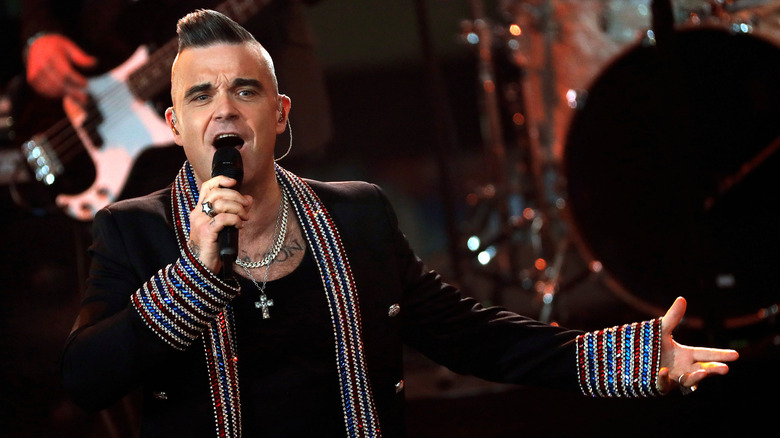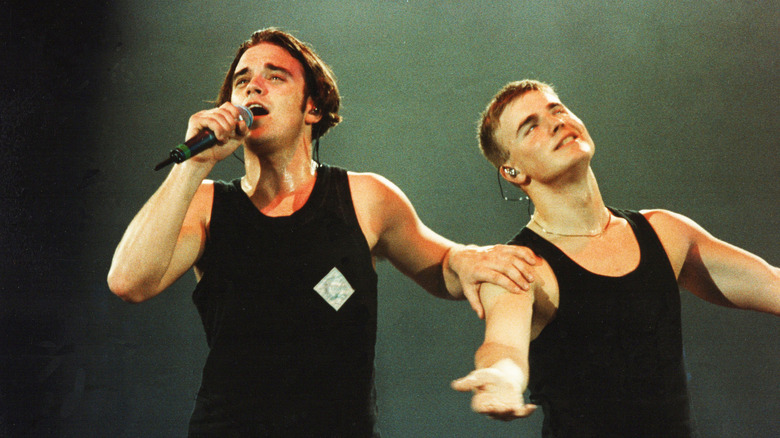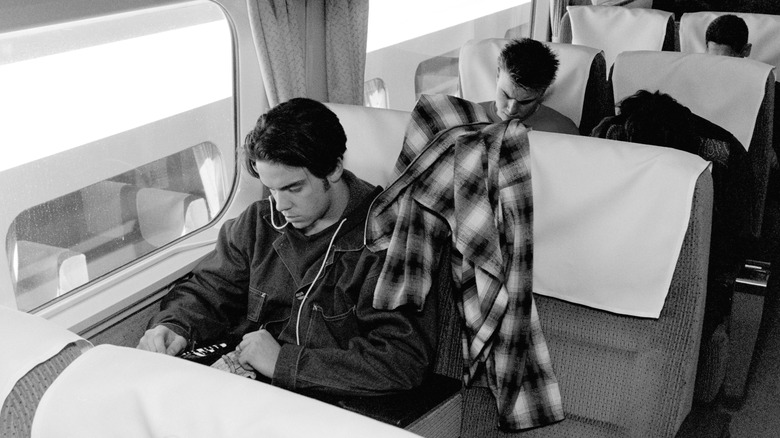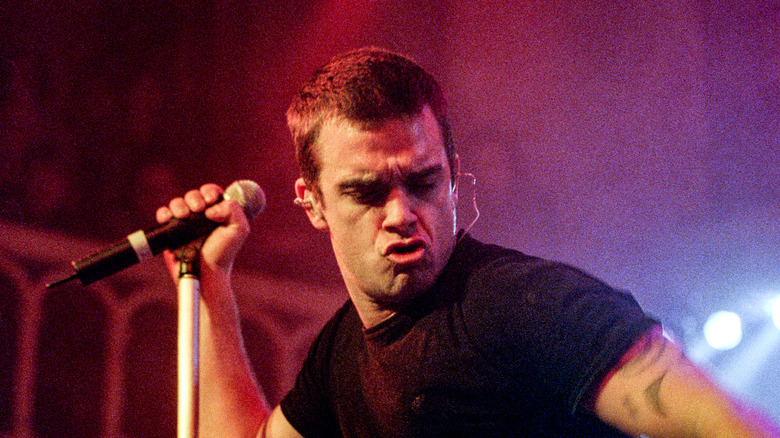Why Robbie Williams Left Take That (And Does He Still Talk To Them)
Take That was one of the most successful and beloved boy bands of the 1990s. With a repertoire of songs such as "Sure" and "Back For Good," the British outfit won fans' hearts around the world. Not only that, but they staged a successful comeback with 2006's "Beautiful World." When the band reappeared, however, Robbie Williams wasn't in the lineup. He had split from the group in 1995, right in the middle of a major tour. Take That broke up in February 1996. The two developments were a surprise for many — Take That, after all, were at the height of their commercial powers, and the split broke the hearts of teenage fans around the world. But why did Williams leave?
The youngest member of Take That, Williams would often clash with Gary Barlow, the band's chief songwriter, who was dubbed by the Mirror "the brains behind the operation." Barlow was and remains an accomplished writer and has won five Ivor Novello awards for songwriting. According to reports that emerged at the time, one big issue for Williams was that he resented playing second fiddle to Barlow. He and Barlow reportedly had artistic differences, too, which created even more friction. Williams' behavior was also becoming a strain for the group preceding the split, though this may have had something to do with the pressure of being in the biggest boy band of the era.
A clash of egos
Around the time that Robbie Williams announced he was leaving Take That, most headlines focused on the rift that had developed between him and the band's main songwriter, Gary Barlow. "My problem has always been with Gary. It was always with Gary. I wanted to crush him," Williams said in an ITV documentary released in 2010 (per The Express). As the years passed and Barlow stayed center stage, an intense feud sparked between the two stars, which festered so much that Williams couldn't bear to be in the band anymore.
Barlow later admitted to BBC Radio 1 (via The Telegraph) that he and the rest of the band could have looked after Williams better. After all, he was the youngest, having signed up for the band at the age of 16, and Barlow was almost 20. When Williams left, he was just 21. Similarly, Williams said in the documentary he is sorry for how he reacted to Barlow in those early days, and their feud has long since ended.
Take That meant huge pressure
The pressures of fame became too much for the youngest member of the troupe. "It was a scary prospect to be out there among something so huge," Robbie Williams admitted in the documentary (per The Express). As Williams later admitted, at the height of his Take That fame he turned to alcohol and drugs to deal with the pressure, which exacerbated the personal issues he had with his bandmates. According to Smooth Radio, there was also friction as a result of Williams' raucous behavior, and fellow Take That alumnus Jason Orange precipitated the split. Per Gigwise, Williams recalled to Radio 4 that Orange told him: "You're going to leave after this tour and what we've decided is, we think it's best you go now, so we can prove we can do this as a four-piece."
By going solo, Williams escaped the commercial expectations that the record label put on Take That in their imperial phase. Indeed, his first solo album — "Life Thru A Lens," which was released after Williams attended rehab — initially sold badly and seemed unlikely to be the breakthrough hit that he had hoped. Nevertheless, he eventually struck gold when the single "Angels" brought the album to the top of the U.K. chart. When he followed it with 1998's megahit "Millennium," critics and Take That fans alike were finally forced to admit that maybe Williams had been right to leave the U.K.'s biggest boyband after all.
Going solo meant creative freedom
While Gary Barlow apparently wanted to focus on love songs, which seemed to be the key to the band's success, and his bandmate wasn't getting the creative input he desired (via BBC News). He even publicly called them out for their lack of creativity. On "Life Thru A Lens," Williams and his songwriting team took cues from some of the biggest British alternative acts of the era, such as Oasis, and explored genres including glam and dance.
Such early experiments established Williams as a pop music chameleon, able to fold disparate influences into hits that unfailingly landed high on the pop charts. "Millennium," for example, is based on the James Bond theme "You Only Live Twice," which branded Williams as a self-consciously British product right at the time Cool Britannia was trending hard. It also helped to push him into classic crooner territory, leading to his "Swing When You're Winning" album of swing cover versions, which topped the charts in several markets. Williams later explored hip-hop, rap, and other musical expressions in his solo album "Rudebox" in 2006 — but that just wasn't Take That's style.
Though contractual obligations meant that Williams' split from Take That was initially expensive and represented a huge risk, in the end it paid off. Williams enjoyed tremendous solo success and reunited on and off with Barlow and company as the years went on, with the band members claiming they had buried the hatchet. He left the band a second time in 2011.
If you or anyone you know needs help with addiction issues, help is available. Visit the Substance Abuse and Mental Health Services Administration website or contact SAMHSA's National Helpline at 1-800-662-HELP (4357).



